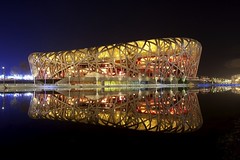 Image by Earth Hour Global via Flickr
Image by Earth Hour Global via Flickr
Tiffany Tan shows how you can have a terrific 12 hours in Beijing

10am: Beijing foreign trade clothing store
10am: Beijing Zoo Julong Foreign Trade Clothing Store
Xizhimen Avenue, Xicheng District Open daily 6.30am-4.30pm
It is wholesale markets like this that make the Chinese shopping experience distinct: Goods at rock-bottom prices, a maze of stalls with narrow walkways and a few genuine brand-name items thrown in with mountains of fakes.
Julong is popular among university students and young professionals hoping to chance upon overruns from brands such as H&M, Zara and Quicksilver. Women's tops go for 10 to 25 yuan, men's T-shirts 30 to 50 yuan and jeans 65 to 90 yuan. Everything else a recessionista needs is here: Sunglasses, belts, bags, shoes, fashion jewellery, hats, swimwear.
Since the prices here are some of the lowest in town, most vendors have a no-bargaining and no-fitting rule. But nothing is impossible to determined shoppers.

12.30 Jingdingxuan dumplings
12.30pm: Jingdingxuan Restaurant
77 West Hepingli Street, Dongcheng District Open 24 hours
This three-storey Cantonese restaurant, adjacent to the Lama Temple and The Temple of Earth, is something of a landmark in this historic location. Jingdingxuan, or "golden cauldron pavilion," is known for its dim sum menu and off-hours promotion; every day from 2pm to 5pm and 10pm to 6am of the next day, selected items are only 5.80 yuan.
Among the dishes on daily discount are steamed chicken claw with black bean sauce, preserved egg and pork porridge and baked taro buns. Other specialities include shrimp dumplings (14.80 yuan), beef rice flour rolls (10.80 yuan) and Sichuan noodles with minced peanuts (6.80).

2pm: Imperial Street
2pm: The Imperial Academy Street
Guozijian, Inner Andingmen Street, Dongcheng District
In June, the Chinese government named Guozijian (or the Imperial Academy) Street one of the country's 10 "history and culture streets". This 700-year-old street is lined with courtyard homes, Chinese scholar trees and shops selling cultural and Buddhist items.
Its main attractions are the Imperial Academy and the Confucian Temple. There's a joint admission fee of 20 yuan, and they are open daily except on Mondays, when they open from 9am to 4.30pm. The academy, built in 1287, was China's highest educational institution during its last three dynasties - Yuan, Ming and Qing (1206-1911). Nowadays, before the annual College Entrance Examination, parents and students come here to pray for blessings. It also has an exhibition room of educational artefacts.
Next door is the Confucian Temple, established in 1302, where intellectuals and emperors paid their respects to the eminent Chinese teacher and philosopher Confucius. On the grounds are 198 stone pillars with names of 5,000 people who passed the imperial examinations in Yuan, Ming and Qing.

798 Art District
5pm: 798 Art District
Jiuxianqiao Road, Chaoyang District
798 is Beijing's version of London's Soho and NYC's Greenwich Village. Its name comes from "Factory 798", one of the many state-owned factories in the industrial zone that produced electronics during China's pre-economic-reform era. The buildings - designed by former East German architects and constructed with the help of Soviet know-how - is the heart of 798's charm.
In 2002, artists and cultural organisations moved into the then-abandoned buildings and set up art galleries, artist studios, design companies, cafes and restaurants. A number of artists and galleries have since moved out, complaining of exorbitant rental fees.
As such, 798 remains one of Beijing's few pockets of quietude, where visitors can see sculptures on a leisurely stroll, check out paintings and photographs, and shop for curios made by struggling artists.

7.30: Tianxiayan
7.30pm: Tianxiayan Restaurant
798 Art District, 4 Jiuxianqiao Road, Chaoyang District, Open daily 11.30am-10:30pm
Rich and spicy Sichuan food is probably the most popular cuisine on the mainland. This three-floor restaurant on the southeastern part of 798 is packed on weekends. Some of its mouthwatering specialities are fried fish with Sichuan pepper (58 yuan), sautéed diced chicken with chilli pepper (32 yuan) and mapo tofu (stir-fried tofu in hot sauce, 16 yuan). Tea is served free. One wall has a Cultural-Revolution-design mural depicting Mao Zedong and Chinese workers and a slogan: "The honour and dream of 798."

Xiu Bar in Beijing
10pm: Xiu bar
6/F Beijing Yintai Centre, 2 Jianguomen Wai Avenue, Chaoyang District, Open 11.30am-2.30pm; 5.30pm-2am (Sun-Thurs); 5.30pm-3am (Fri-Sat)
Park Hyatt's three-month old bar is the newest "It" place in town. The upscale venue draws an eclectic crowd of business travellers, tourists, expats, Chinese yuppies and professional partygoers. Inside, traditional and contemporary elements meld: Two terraces are accented by flowing water and these surround a Chinese pavillion that contains the main bar, a stage for the live band, an open kitchen, a wine room and smaller lounges. Cocktails are 65 to 70 yuan, a glass of wine goes for betweeen 60 to 140 yuan, while snacks 20 to 60 yuan. Check out the restrooms for a rare sight in China: Bidets with heated seats.
----------
From TODAY, Living – Weekend, 29/30-Aug-2009
![Reblog this post [with Zemanta]](http://img.zemanta.com/reblog_e.png?x-id=2c12c188-2cee-4157-9c84-718e1c0f9907)
No comments:
Post a Comment